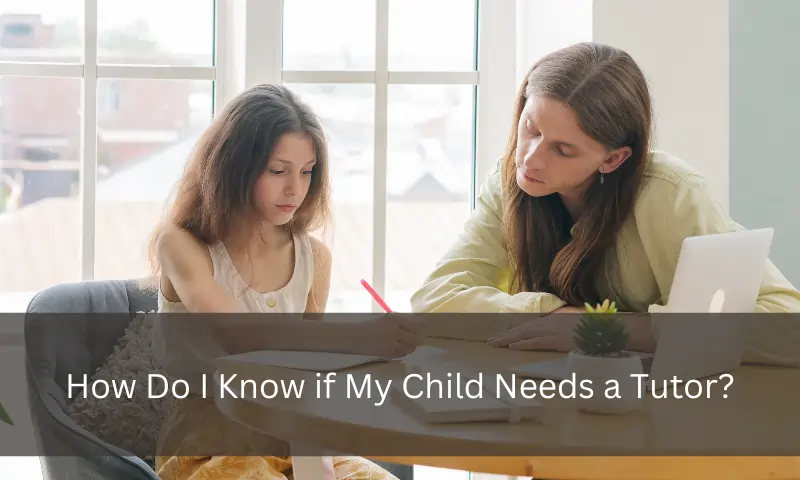Schools do their best in assisting kids in learning in the manner that suits each student best. But occasionally, they simply get stuck. While guardians and parents should help children keep up with their studies, bringing in a tutor is the right step in case your kid needs specialized assistance.
Depending on your kid’s needs, you may require someone who has an in-depth understanding of math for fourth graders or is worth considering due to the vast experience in tutoring. A tutor should possess excellent study techniques tailored to your child’s unique learning needs. A good tutor is also able to provide academic support required to get a kid back on track and keep up with their peers.
But how do you know if your kid needs a tutor? Here are a few reasons:
1. Your child is falling behind in school
Table of Contents
When your child starts receiving lower grades, this is the most evident indication that they might need a tutor. This is a sign that something isn’t working. Are failures at school a result of improper study habits? Is it because kids don’t realize the value of education? Is it possible that they don’t comprehend the subject matter? There are several potential causes for your student’s failures. Meeting with your kid’s teacher will help you identify the skills your child should develop or resources they need, which enables you to choose the ideal tutor.
Several questions will help you arrive at the best tutor.
- Is there a specific topic your kid needs help with?
- Are low grades stemming from a child’s ability to learn?
- Is their progress being impacted by something external?
You can settle on a more personalized solution if you discuss these questions with your child’s teacher and potential tutors from math websites.
2. Your kid lacks organization
Effective use of critical functioning skills is a problem that frequently affects young kids. These include time management, prioritization, and planning abilities. Students often have the correct answer, are bright, and comprehend the work, but they need more time to prepare adequately.
By teaching your child how to schedule their time correctly and prioritize assignments, a tutor can help students study effectively and become more organized. Having a tutor to teach these skills will significantly impact your child’s education since you and a school teacher might lack adequate time.
When kids are better organized, they can maintain a healthy balance between school and leisure, have time to be kids still, and participate in an interactive maths lesson with pleasure.
3. A kid abruptly stops talking about school
You can tell how well your child is doing in their classes by noticing how they respond to discussions about school. You should get worried if your child used to discuss tests, homework, and teachers in length but now refuses to do so or becomes agitated or furious.
For instance, in a situation when you inquire about a day at school, you may frequently receive the one-word response, “Fine.” Many parents find such a reply adequate and do not seek further explanation. Instead, try to gather more specifics by asking your youngster less direct questions.
Find out what they enjoy and dislike about particular classes. Pay close attention to what they say in return. A sign that your child may not be doing well is if they talk very little, grow upset, or abruptly change the topic.
4. A child frequently puts off doing homework
Regular procrastination or a general lack of interest in studies in a child may indicate a more serious issue. A kid might need your help to comprehend the subject or require assistance of a tutor via live online math classes.
It is often easier for a child to ignore a task they don’t understand than to stare at it. However, falling behind is difficult for a student, so it’s critical to get involved before a kid becomes overburdened.
5. Your child excels academically and is far ahead of their peers
Tutoring is frequently used to help students who are falling behind. But contrary to popular belief, even students excelling in certain subjects might need to work with a tutor.
Many brilliant kids get bored in school because of the slow pace of learning and may later display behavioral issues, finally diverting their energy to less unsavory activities.
A tutor can help your child push their boundaries and rekindle their passion for studying by working with a kid on exploring new subjects and themes.
6. Your child lacks self-assurance or is reserved in class (but not elsewhere)
Let’s say your child is a chatterbox at home or doesn’t mind bombarding friends and family with inquiries. You will naturally be taken aback when you learn from the teacher that a child is quiet in class or reticent to ask or answer questions in that setting.
Such kids could benefit from tutoring by developing basic knowledge and skills in various subjects and boosting their confidence. The lack of confidence could indicate that they are uneasy with what they have learned so far in fourth grade math or high school algebra.
7. You believe or are aware that your kid has a learning disability
Children with learning difficulties will typically receive additional support from schools. There are courses and teaching approaches created explicitly for them.
However, many parents claim that school support is only insufficient to keep a child up with their peers. Experienced tutors can address different learning difficulties, helping your child keep up with their studies and grasp concepts better.
How can I locate a tutor?
If you have been asking yourself the question “should I get a tutor?” and your child displays some or most of these signs, the next step is to seek a tutor. Investigate your area resources, look up online testimonials for tutoring websites, browse local university employment listings for motivated high-achieving college students, and reach out to friends and family for suggestions.
These are practical tips for finding a tutor to help your child meet their potential.
Take away
You should definitely notice the signs that your children need tutoring. Together with a qualified tutor, you will easily identify areas your child might be struggling with and create a plan to help a kid back on track. Good luck!



